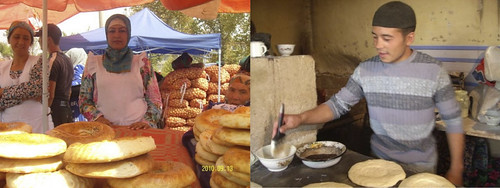Lepeshka bread is a staple throughout Central Asia and happens to be the national bread of Tajikistan! Due to its cultural importance, we decided to highlight the many Tajik borrowers that are in the business of baking this traditional bread! There are currently 100 borrowers on Kiva’s website whose business involves Lepeshka bread, and 99% of them are in Tajikistan.
Lepeshka bread bakers are both men and women, young and old.
Marifat is a divorced mother of two children and, for the last four years, has had a bread bakery business. Marifat has a reputation as a goal oriented, hard-working, but pleasant merchant. She has established a good credit history by diligently repaying five loans from IMON International. Her current loan of $1,500 is 63% repaid and has helped her purchase flour at wholesale to bake the national lepeshka bread.
Rahimjonov Zafar is 23 years old and is married with one child. Zafar is the main breadwinner in the family. For more than 8 years, Zafar has been baking the national lepeshka bread. He believes that this business is profitable and is not subject to seasonality. He gets up early and bakes lepeshka so that people have it fresh on their tables for breakfast.
Lepeshka bread (also called lepioshka in Russian) is a version of Central Asian naan. It has a lot of symbolism in Tajikistan and plays an important role in social settings. When hosting a meal, guests will always be offered this bread accompanied by tea. Before eating, the host will to tear the first loaf of lepeshka, pass it with the right hand to the guests while the left hand is over the heart. Leftover lepeshka is never thrown out; no lepeshka bread is to be wasted! Instead, extra bread is put into water and made into a soup-like breakfast or, last resort, made into feed for animals.
During the Muslim holiday of Ramadan, lepeshka bread is used to break the fast. On the first and last day of the holiday, only bread and tea are supposed to be consumed; and of course, the bread has to be lepeshka!
Want to make your own lepeshka bread? Check out this Central Asian Naan Recipe!
